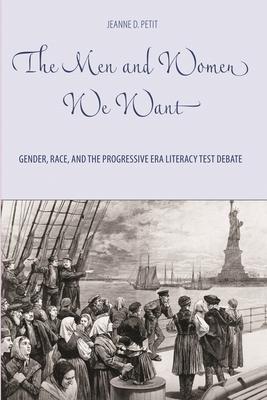
Book
The Men and Women We Want: Gender, Race, and the Progressive Era Literacy Test Debate
(Write a Review)
Paperback
$36.89
Jeanne Petit argues that the literacy test debate was about much more than reading ability or the virtues of education. It also tapped into broader concerns about the relationship between gender, sexuality, race, and American national identity. The congressmen, reformers, journalists, and pundits whosupported the literacy test hoped to stem the tide of southern and eastern European immigration. To make their case, these restrictionists portrayed illiterate immigrant men as dissipated, dependent paupers, immigrant women as brood mares who bore too many children, and both as a eugenic threat to the nation's racial stock. Opponents of the literacy test argued that the new immigrants were muscular, virile workers and nurturing, virtuous mothers who wouldstrengthen the race and nation. Moreover, the debaters did not simply battle about what social reformer Grace Abbott called "the sort of men and women we want." They also defined as normative the men and women they were -- unquestionably white, unquestionably American, and unquestionably fit to shape the nation's future. Jeanne D. Petit is Associate Professor of History at Hope College.
Jeanne Petit argues that the literacy test debate was about much more than reading ability or the virtues of education. It also tapped into broader concerns about the relationship between gender, sexuality, race, and American national identity. The congressmen, reformers, journalists, and pundits whosupported the literacy test hoped to stem the tide of southern and eastern European immigration. To make their case, these restrictionists portrayed illiterate immigrant men as dissipated, dependent paupers, immigrant women as brood mares who bore too many children, and both as a eugenic threat to the nation's racial stock. Opponents of the literacy test argued that the new immigrants were muscular, virile workers and nurturing, virtuous mothers who wouldstrengthen the race and nation. Moreover, the debaters did not simply battle about what social reformer Grace Abbott called "the sort of men and women we want." They also defined as normative the men and women they were -- unquestionably white, unquestionably American, and unquestionably fit to shape the nation's future. Jeanne D. Petit is Associate Professor of History at Hope College.
Paperback
$36.89